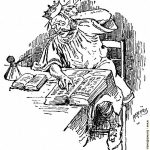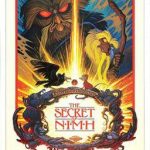Chanukah begins at sundown today. One of my annual traditions is that every year at the start of it I take a few minutes to remember a squirrel and the lesson it taught me about life. This is a revised version of an earlier post because each year the lesson always seems slightly different.
Gassing the woodchucks didn’t turn out right.
The knockout bomb from the Feed and Grain Exchange
was featured as merciful, quick at the bone
and the case we had against them was airtight,
both exits shoehorned shut with puddingstone,
but they had a sub-sub-basement out of range.
-Maxine Kumin, Woodchucks
I have a contract with the squirrels. They may not consider it legally binding but it should be understood by both of us that they’re supposed to stay out of my attic and not come in to make nests in the insulation and chew the rafters and wiring. Since I can’t retaliate by moving into their nests in the trees I reserve the right to set traps in the attic. A few years ago I woke up to squirrels or mice or used car salesmen or some other kind of vermin scrabbling around in the ceiling over my head. I set traps in the attic and whatever it was avoided the traps and went away. I like to think it or they saw the traps and said, “Holy mackerel, let’s move to some place safer like a nuclear reactor!” This is the way it should work. In December, though, a few dumb squirrels moved in and were holding cocktail parties well past midnight. I announced the terms of our agreement very loudly as I set out traps smeared with peanut butter. I didn’t really want to set the traps, primarily because that meant going up in the attic, which meant climbing that rickety wooden ladder. The ladder has two warnings on it. One, in huge print, says, “Failure to use ladder correctly could result in damage to the ladder!” As far as I can tell “failure to use ladder correctly” means dousing it with gasoline and setting it on fire. The other warning, in fine print, says, “Oh yeah, you might also hurt yourself, so please take off those stupid slippers and put on some real shoes.” But the real problem is I don’t like heights, or, to be more specific, landing at the bottom of them. I get the shakes when I stand on a chair. Once in the attic I’m fine because I’m on solid ground again, or at least solid plywood over that insulation that looks like cotton candy but tastes much better. It’s the climbing part that gets to me, especially since I have to use at least one hand to carry the traps. I use the spring bar traps, the kind that are sold under the slogan, “Build a better mouse trap and the world will beat a path to your door,” except I use the larger ones. The slogan for the large ones is: “These will cut your fingers off.” I could pride myself on being able to set these traps and position them with the steady hands of a neurosurgeon or bomb defuser, but there’s nothing good about any part of the job.
In her poem “Woodchucks” Maxine Kumin goes from killing the woodchucks with poison gas to picking them off with a gun. It ends with her saying there’s one woodchuck who eludes her, and she concludes, “If only they’d all consented to die unseen/gassed underground the quiet Nazi way.” It’s not a perfect metaphor, although if it were it wouldn’t be a metaphor. The only perfect metaphor that I know of in English literature is, “a rose is a rose is a rose”. There was no justification for the Nazi concentration camps. The woodchucks, on the other hand, threatened Kumin’s food supply, or at least her rhubarb and brussels sprouts. Interspecies violence is, like it or not, part of nature, and often fundamental to survival. The squirrels don’t know this, of course, any more than Kumin’s woodchucks who saw her garden as an open buffet. When I set traps for the squirrels it wasn’t because of an irrational and unnecessary prejudice against them. It was because they could chew through an electric cord and burn the house down, which would mean we’d all be out of a place to live. And I hoped the squirrels would see the traps and leave. Unfortunately it didn’t work that way. I took several squirrels, their necks broken, to the garbage. Then one night I found a squirrel wounded but still alive in one of the traps, struggling to get away, but badly injured. Its body was twisted and there was a gash down its back where the hard metal rod had cut. I knew I couldn’t let the squirrel go. Even if it survived its injury, even if it avoided being run over by a car, even if it escaped neighborhood dogs, stray cats, coyotes, foxes, owls, hawks, werewolves, and pangolins, even if it wasn’t attacked by other squirrels, it would just get back into the house. And if it didn’t it was still in excruciating pain. I’d caused it to suffer and I had a responsibility to end that suffering. I knew all this, but I wasn’t looking forward to what I had to do either. I put the trap with the squirrel still in it into a white plastic garbage bag and took it out to the driveway. I got a shovel out of the basement. The squirrel struggled a little in the bag, which I appreciated because it told me exactly where to hit. I wanted to make this as quick and merciful as possible for both of us. I nearly lost my nerve at the last minute. My wife had suggested I use a hatchet, but I didn’t want to do that because I’d actually have to look at the squirrel.
A history teacher once told me that Mary Queen of Scots, as she approached the chopping block, turned to her executioner and said, “Be mercifully quick.” Her request apparently made him lose his nerve; it took him three tries to finish the job.
After the clang of the shovel faded, I heard someone a few houses away in their backyard practicing “Jingle Bells” on a flute. For some reason this song always makes me think of people and woodland animals sharing the sleigh ride together, a sort of Eden with snow and blinking lights. The sun had just set, and in the stillness I realized that in some houses and places of worship the first candle of the menorah had either been lit or was about to be lit. I’m not Jewish. I’m not even religious in any traditional sense, but I know Hanukkah is a holiday that celebrates hope and perseverance. It’s about a miracle of light and life–one day’s worth of oil burning for eight–coming to people who have just been through darkness and death. It’s a celebration by people who survived an all-out attempt to wipe them off the face of the Earth. I also understand that over a thousand years ago two rabbis, Shammai and Hillel, had competing ideas about how Hanukkah should be celebrated. Rabbi Shammai said all candles should be lit on the first night and then one extinguished on each night as a literal representation of the diminishing oil. Rabbi Hillel said that one candle should be lit each night so on the final night all eight candles would blaze with glory. Instead of increasing darkness there would be growing light and hope. Hillel’s tradition is the one that’s survived. None of this has anything to do with the squirrels, but it all came to me anyway. There’s a strange beauty in Shammai’s literalness, and I assume the growing darkness would end with a grand blaze to celebrate the triumph of the Maccabees and the re-dedication of the temple. Still on this night I was glad for Hillel’s tradition; glad that lights were being lit against the dark. I didn’t feel compelled to think about all these things as I emptied the trap at the edge of the circle of light from the patio. It seemed like the universe was conspiring to make me feel bad about what I’d done, but I accepted the responsibility. I deserved it. I can rationalize until I’m blue in the face. I can say that even though one-fourth of all mammal species are presently in danger of extinction squirrels aren’t one of them. I can say that at least I’m not actually harming another person, and that through history people have done terrible things to other people with less justification than I have for killing the squirrels in the attic. Nothing I can say changes the fact that, hokey as it sounds, I don’t want to be directly responsible for the deaths of squirrels. The Netsiliks, like other so-called primitive peoples, had specific rituals for killing seals, polar bears, and other animals they depended on for food. The Netsiliks said the rituals release the spirit of the animals back to the wild so they could return in earthly form. It’s a way of acknowledging their dependence on other species. I don’t think the disappearance of squirrels would tip the balance and lead to the extinction of homo sapiens, but being too casual about extermination threatens us all. As long as the traps were killing them I could shirk responsibility. I was just a caretaker; the traps were doing the work. When the trap failed, I had to face my own role in squirrelicide.
I realized I’d have to take the ladder outside, quit my whining about my fear of heights, find where the squirrels were getting in, and seal it up. And ultimately the problem wouldn’t be fixed until we put on a new roof. It was up to me to keep them out, because ultimately that was the only way to prevent more deaths. I’m pretty sure that, somewhere in the contract, it says that I’m responsible for this because I’m the one with a memory, a conscience, and, for that matter, a big warm attic full of nesting material. It must be in the fine print.
And now, since Chanukah is a celebration, here’s something that I hope will bring some light to the darkness.






A little tears, a little smile. What would ANY Jewish Holiday be without either? Thank you for this..
Not to mention a little guilt. It’s funny to me that I often get asked, “Are you Jewish?” And then when I share the story of the squirrel one person asked, “Are you sure you’re not Jewish?”
Anyone who knows me knows I’ve had my share of squirrel horror stories, especially with my arch-nemesis, Squeaky Fromme. I’m afraid I can’t be quite so mercenary though–we bought a live trap and the squirrels seemed to appreciate that, and the lovely country drive to their new homes. I’m lucky we live out in the middle of nowhere so it’s hard for them to find their way back.
Making it hard for the squirrels to find their way back is ideal, but we live in a suburb where even if I took a captured squirrel somewhere else there are plenty more to replace it. Raccoons are even worse: I understand a raccoon can find its way back even if taken more than a hundred miles from its home. Fortunately we don’t have too many of those in the neighborhood.
That was a brutal journey, but one I’m happy you took us on. You said this is a retelling … did you seal the aperture and avoid the infestation of further Sciuridae??
Not only did I seal the aperture, my wife and I had an entirely new roof put on and the wood front was replaced with plastic panels. That seems to have solved the problem. At least we’ve had no further infestations. The squirrels are sneaky, though, and may yet find another way in.
Wow very impressive that you know the difference between Hillel and Shammai- gonna have to echo the comments you made above: are you sure you’re not Jewish? 😉
I’ve studied Judaism extensively and have considered converting, but, to quote the very wise Groucho Marx, who just happened to be Jewish, I’d never want to belong to any club that would have someone like me as a member.
Beautiful, Chris. Thanks for shining more light in the darkness.
I always appreciate the light you bring here and to your own blog.